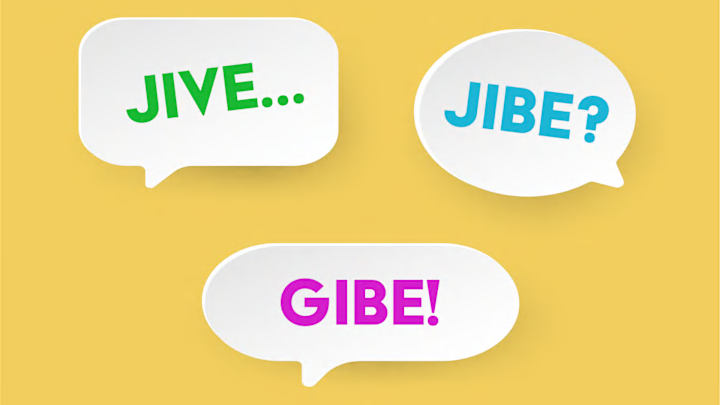It’s hard enough to differentiate between two similar English terms: effect and affect, for instance, or disinterested and uninterested. Toss a third into the mix and you might start to feel like it’s more trouble than it’s worth to try to use any one of them correctly. Case in point: jive, jibe, and gibe.
Gibe is the oldest of the three, having entered the lexicon way back in the 16th century. You could use it as a verb, meaning “to speak sneeringly” or “to utter taunts,” per the Oxford English Dictionary, or as a noun describing such taunts. Here’s where it starts to get confusing: Jibe is an alternative spelling of gibe. So a schoolyard bully, for example, can technically fling jibes or gibes at their classmates.
In the 19th century, another definition of jibe cropped up: “to chime in (with),” or “to be in harmony or accord.” While it’s not totally clear where this sense comes from, the OED suggests that it may be a variant of the word chime itself. Say a detective unearths some evidence that contradicts their leading theory about a certain crime. They could say the new intel doesn’t jibe with what they already knew.
Then, in the 1920s, jive appeared, typically describing talk or conversation that was deceptive, phony, or just plain wrong. Though the term’s exact origins are a mystery, Black Americans—especially in Harlem—were instrumental in popularizing it. Eventually, jive also came to mean jazz (often swing music, specifically), as well as the type of dancing you’d do to jazz.
And here’s where it gets really confusing: By the 1940s, according to the OED, people had also started using jive to mean “to taunt” and also “to make sense; to fit in.” In short, English speakers have been mistaking jive for jibe (or gibe) for a good 80 years—long enough, in fact, for the OED to recognize those two somewhat accidental definitions of jive as official ones.
But not everybody does. So if you want to avoid having to read this entire article to someone to convince them that, no, you didn’t just use jive incorrectly, here are some foolproof guidelines:
- Use gibe in reference to sneering or taunting.
- Use jibe in reference to being in harmony.
- Use jive in reference to phony talk or jazz. (The Bee Gees’ 1975 hit “Jive Talkin’” might help you remember this one.)
